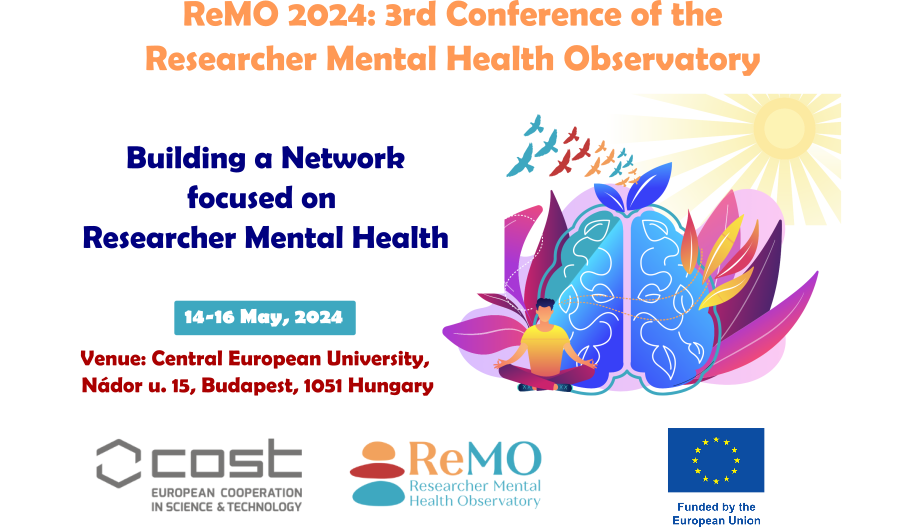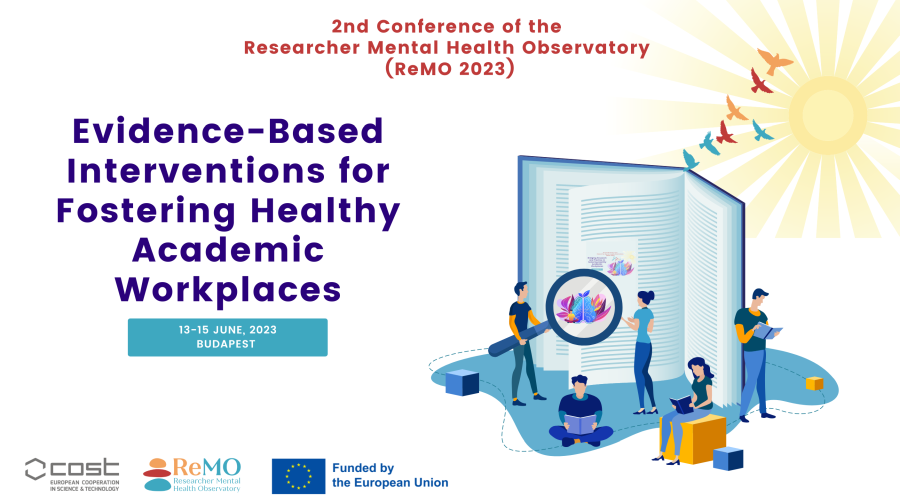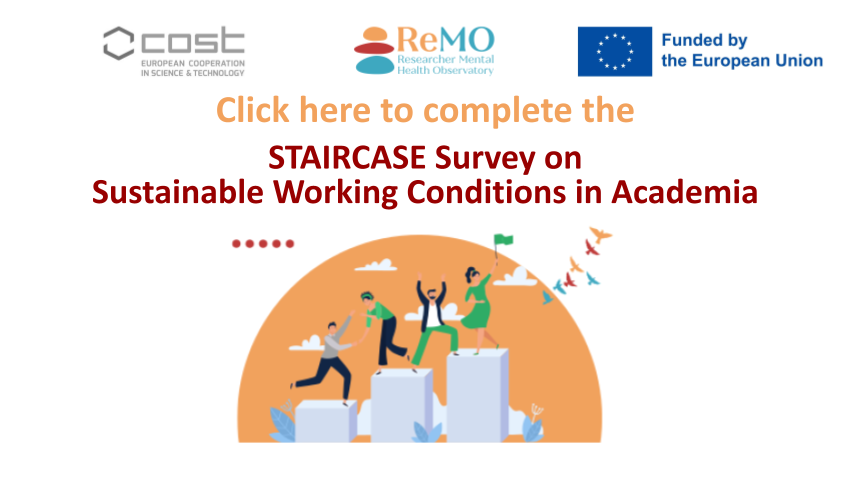ReMO COST Action CA19117: "Researcher Mental Health"
The ReMO COST Action focuses on wellbeing and mental health within academia, a theme of strategic importance for the European Research Area. Previous research shows that low levels of wellbeing and mental health problems have a negative impact on individual, team and organizational performance, triggering significant costs. In addition, institutional context, organizational structure and culture, as well as managerial practices have significant impact on wellbeing and health of employees. Therefore, general insights on the causes of workplace wellbeing and mental health need to be refined with contextual specifics (i.e. in academia) in order to develop tailored, effective and efficient prevention and action programs.
ReMO 2024: 3rd Conference of the Researcher Mental Health Observatory

14th-16th May, 2024, Budapest, Hungary.
PROGRAMME
The Programme can be downloaded from https://projects.tib.eu/fileadmin/data/remo/docs/ReMO2024Programme.pdf
The Basic Agenda is:
Venue: Central European University, Budapest, Hungary
14th May
14:00 – 16:00 3 Parallel Workshops related to developing training based on a Problem-based Learning Approach
- Choosing and Managing your PhD supervisor
- Breaking the silence around well-being at work
- Effectuating institutional change
16:30 – 17:30 ReMO Co-Creation/Theatre Action Project
15th May
10:00 – 11:00 ReMO COST Action Progress
11:30 – 13:00 3 Parallel Session featuring ReMO Grantees
14:00 – 15:00 3 Parallel Workshop Sessions
15:30 – 17:00 ReMO Co-Creation/Theatre Action Project
16th May
10:00 – 11:00 Debate on Manifesto: What has ReMO COST Achieved?
11:30 – 13:00 3 Parallel Workshop Sessions
14:00 – 15:00 3 Parallel Session featuring ReMO Article Collection Authors
15:30 – 16:30 Final Plenaries
16:30 Finale of ReMO Co-Creation/Theatre Action Project
Followed by reception on the rooftop of the CEU building
REGISTRATION
Register for the in-person attendance at the Conference at https://scilink.eu/product/remo2024/
Register for virtual attendance at the Conference: https://us02web.zoom.us/meeting/register/tZcpdOGrpjstGNzNfKgDACdS5suX-OjZt2sW
THEME
"Building a Network focused on Researcher Mental Health"
The ReMO COST Action focuses on wellbeing and mental health within academia, a theme of strategic importance for the European Research Area and beyond. We would like to invite our fellow researchers and practitioners to critically think about reporting on Building a Network focused on Researcher Mental Health. How can stakeholders in the research environment develop interventions tackling this challenge in a rapidly changing world? We therefore hope for an inspiring conference with presentations, workshops and keynotes that will not only showcase the newest findings about the cognitive, motivational, and emotional aspects of Researcher Mental Health and Well-being, but will also be a place to discuss the global challenges that shape the present and will define the future of our research workplaces.
The conference will be a hybrid conference within the context of the ReMO COST Action with free online participation and in-person attendance at the Central European University in Budapest, Hungary.
VENUE
The ReMO 2023 Conference will take place at the Central European University, Nádor u. 15, Budapest, Hungary.
ORGANIZING COMMITTEE
- Adam Keszler, SciLink Foundation, Debrecen, Hungary
- Emese Vitae, SciLink Foundation, Budapest, Hungary
- Szidonia Rusu, SciLink Foundation, Budapest, Hungary
- Gábor Kismihók, Leibniz Information Centre for Science and Technology, Hannover, Germany.
- Brian Cahill, Leibniz Information Centre for Science and Technology, Hannover, Germany.
- Stefan T. Mol, University of Amsterdam, Amsterdam, Netherlands
REGISTRATION
Registration will open for both physical and virtual participation at a later stage.
The ReMO COST Action covers the main expenses related to the conference and there will be no charge for either physical or virtual participation. The capacity of the venue will dictate a maximum number of physical participants. There may be a charge to cover the cost of the conference dinner and other meals. Details will be made available when registration opens.
TRAVEL GRANTS
Some Travel Grants will be funded by the ReMO COST Action with priority given to ensuring the participation of:
- Speakers
- Researchers from Inclusiveness Target Countries (ITCs)
- ReMO COST Action Working Group Members
- Ensuring gender balance
- Early Career Investigators (below 40 years of age).
STAIRCASE: Sustainable Working Conditions in Academia Survey
The STAIRCASE survey aims to understand the impact of working conditions on mental health and well-being in academia, enabling evidence-based recommendations for impactful change. It is part of the EU-funded Researcher Mental Health Observatory (ReMO), a COST Action that is building a network that advocates healthy and sustainable working conditions in academia.
The STAIRCASE Survey is a unique and transformative initiative in both its pan-European outreach and bottom-up driven approach. Your participation is needed to ensure a proper representation of your country and institutions. The STAIRCASE survey, conducted by researchers for researchers, aims to bring about transformative change within the academic system, through the identification of factors that foster healthy and sustainable working conditions. By sharing your experiences regarding mental health and working conditions, you are directly contributing to the generation of valuable insights that will yield evidence-based recommendations for policy changes.
Please fill out the Staircase Survey here: https://service.tib.eu/remosurvey/index.php/817261?lang=en
Your participation is instrumental to ensuring proper representation of your institution and country. By actively participating, you enhance the likelihood of gathering sufficient data to develop tailored recommendations that are specific to your unique context and circumstances.
2nd Conference of the Researcher Mental Health Observatory (ReMO 2023)
Evidence-Based Interventions for Fostering Healthy Academic Workplaces

13th-15th June, 2023, Budapest, Hungary.
PROGRAMME
The draft programme of the ReMO 2023 Conference can be downloaded here.
REGISTRATION
Register for virtual attendance at the Conference: https://us02web.zoom.us/meeting/register/tZIvde6oqj4pHd2paBZGQPlPtLBIho8W11OD
Register for the in-person attendance at the Conference at https://scilink.eu/product/remo2023/
THEME
"Evidence-Based Interventions for Fostering Healthy Academic Workplaces"
The ReMO COST Action focuses on wellbeing and mental health within academia, a theme of strategic importance for the European Research Area and beyond. We would like to invite our fellow researchers and practitioners to critically think about reporting on Evidence-Based Interventions for Fostering Healthy Academic Workplaces. How can stakeholders in the research environment develop interventions tackling this challenge in a rapidly changing world? We therefore hope for an inspiring conference with presentations, workshops and keynotes that will not only showcase the newest findings about the cognitive, motivational, and emotional aspects of Researcher Mental Health and Well-being, but will also be a place to discuss the global challenges that shape the present and will define the future of our research workplaces.
The conference will be a hybrid conference within the context of the ReMO COST Action with free online participation and in-person attendance at the Central European University in Budapest, Hungary.
OBJECTIVES AND SCOPE
The ReMO 2023 programme committee warmly invites you to participate in the exploration of the theme “Evidence-Based Interventions for Fostering Healthy Academic Workplaces”. We aim to collaborate with each other and share and discuss the latest research and practice in Researcher Mental Health and Well-being as we work to achieve the objectives of the Researcher Mental Health and Well-being Manifesto:
- At the community level:
- Supporting grassroots initiatives;
- peer-to-peer support actions;
- a person-centred approach to training and career management; and
- anecdotal evidence collection.
- At the institutional level:
- Recognizing mental health and well-being issues;
- sharing best practices across institutions;
- development of fair and personalised research performance assessment;
- addressing well-being in doctoral and staff professionalisation; and
- supporting change initiatives at the organisational level.
- At the policy level:
- ongoing dialogue between all relevant stakeholders;
- systematic and structured data collection for evidence-based policy making;
- dissemination of state-of-the-art evidence and tools addressing mental health; and
- revising the academic reward system.
We will have several keynote speakers and expert-led workshops, paper presentations, interactive poster sessions, and round table discussions.
VENUE
The ReMO 2023 Conference will take place at the Central European University, Nádor u. 15, Budapest, Hungary.
SUBMISSION DETAILS
All papers will be assessed by blind peer review and are selected based on merit and relevance. Submissions must be made online using the EasyChair abstract submission system by March 31 17:00 CET (deadline extended) .
Full instructions for submitting your abstract are provided in the online system. The deadline for submission of abstracts has been extended to March 31st 17:00 CET.
The abstract template can be downloaded here.
All abstracts must be between 500 and 1000 words excluding title, references and tables/graphs. Names and institutions/organisations of authors should not be included in the text of the abstracts to facilitate the blind peer review process but entered separately in the online system.
Abstracts should address one of the categories below:
- Scientific and practitioners' research presentations
- Bottom-up and community-driven Interventions: Assessing the effectiveness and practical implementation of bottom-up and community-led interventions, such as, counselling support, peer-to-peer support, online networks and activities, mindfulness, yoga and other tools for mental health.
- Institutional interventions and policies: Assessing the effectiveness and practical implementation of interventions and policies within institutions to address mental health, understand prevalence within institutions, reduce stigma and mandate support within institutions will be brought together in order to create evidence-based understanding of what ‘best practice’ looks like, what the practical challenges are and how they can be addressed, to share institutional learning and break down barriers and taboos in institutions recognising and addressing challenges within their workplace environments.
- Policy-Level Insights: Research and initiatives providing insight on systemic issues beyond any particular organisation or discipline and bringing together cross-institutional evidence on the prevalence, characteristics of mental health within research workplaces, and what can be done at a system level.
- Workshop/hands-on practices for enhancing researcher mental health and well-being that facilitate community feedback, development of experimental design and collaboration.
Abstracts will be published open access in a Book of Abstracts. Selected contributions will be invited to submit a paper to a special journal issue.
CRITERIA FOR EVALUATION
- The Abstract should relate to the scientific objectives of ReMO as described in the Researcher Mental Health and Well-being Manifesto.
- Relevance of the topic to the work of one of ReMO’s three Working Groups (System Level, Institutional Level, and Local Actors)
- Clarity of research question(s) and/or focus of enquiry/discussions/workshops
- Applicants coming from Inclusiveness Target Countries (ITCs) will be given priority
- Robustness of analytical and/or theoretical framework
- Significance for researcher mental health practice, policy and/or theory
All submissions must directly relate to the field of researcher mental health with a focus on practices and policies in place to address researcher mental health and may offer critical analysis or review of issues for researchers of all career stages.
Participants will be notified of acceptance decisions by April 28th.
PROGRAMME COMMITTEE
- Gábor Kismihók, Leibniz Information Centre for Science and Technology, Hannover, Germany.
- Brian Cahill, Leibniz Information Centre for Science and Technology, Hannover, Germany.
- Stéphanie Gauttier, Grenoble École de Management, Grenoble, France.
- Janet Metcalfe, Vitae, Cambridge, United Kingdom.
- Stefan T. Mol, Amsterdam Business School, University of Amsterdam, Amsterdam, the Netherlands.
- Darragh McCashin, Dublin City University, Dublin, Ireland.
- Fatma Güneri, Université Catholique de Lille, France
- Johannes A. Karl, Dublin City University, Dublin, Ireland.
- Gökce Gökalp, Middle East Technical University, Ankara, Turkey.
- Dilara Özel, Middle East Technical University, Ankara, Turkey.
- Neslihan Gök Ayyıldız, Middle East Technical University, Ankara, Turkey.
- Maria Bostenaru Dan, "Ion Mincu" University of Architecture and Urbanism, Romania.
- Mathias Schroijen, Université Libre de Bruxelles, Belgium.
- Murat Güneş, Institute of Microelectronics of Barcelona, Spain.
- Mayya Sundukova, Open Life Science, UK and University of Extremadura, Spain
- Sabina Osmanovic, University of Montenegro, Montenegro
- Matilde A. Rodrigues, Escola Superior de Saúde, Instituto Politécnico do Porto, Portugal.
- Alves Ferreira, João Miguel, Faculty of Medicine, University of Coimbra, Portugal.
- Enric Garcia Torrents, Medical Anthropology Research Center, Universitat Rovira i Virgili.
- Lorena Cudris-Torres, Universidad de la Costa, Colombia; Member OWSD Colombia Chapter, Colombia.
- Tuğba Yılmaz, Marmara University, Psychology Department, İstanbul, Turkey.
- Irsida Mehmeti, Catholic University Our Lady of Good Counsel, Tirana, Albania.
- Sarah Ng, Psychological Sciences and Health, University of Strathclyde, United Kingdom.
- Marlene Santos, Escola Superior de Saúde, Instituto Politécnico do Porto, Portugal.
- Ariel Frajerman, Faculty of Medicine, Paris-Saclay University, France
- Rita Vaičekauskaitė, Faculty of Health Science, Klaipeda University, Lithuania
- Christiane Schwieren, Economics, Heidelberg University, Germany
- Nuno Barbosa-Rocha, Center for Translational Health and Medical Biotechnology Research, School of Health, Polytechnic of Porto, Portugal
- Cornelia Măirean, Alexandru Ioan Cuza University of Iasi, Romania
- Fatma Kantaş Yılmaz, University of Health Sciences, İstanbul, Türkiye
- Ana Beatriz Marques Carvalhinho, Gabinete de Apoio Psicológico do Instituto Superior Miguel Torga, Coimbra, Portugal.
- Claudia Iuliana Iacob, University of Bucharest, Bucharest, Romania.
- Hernando L. Bernal Jr., Far Eastern University - Dr. Nicanor Reyes Medical Foundation, Philippines
- Ömer ÖZER, Anadolu University, Open Education Faculty, Social Work and Consultancy Department, Eskisehir, Turkey
- Dragan Mijakoski, Institute of Occupational Health of RN Macedonia, Faculty of Medicine, Ss. Cyril and Methodius, University in Skopje, Skopje, RN Macedonia
- Vesna Teofilović, University of Novi Sad, Faculty of Technology Novi Sad, Serbia
- Urszula Ziemiańczyk, Faculty of Production and Power Engineering , University of Agriculture in Krakow, Association "PROMENTOR", Poland
- Rivka Tuval-Mashiach, Department of Psychology, Bar Ilan University, Israel
- Olga (Olya) Vvedenskaya, Dragonfly Mental Health, Germany and USA
- Louiza Ioannidou, Frederick University, Cyprus
- Mary Joan Camilleri, University of Malta, Malta
- Inge van der Weijden, Leiden University, the Netherlands
- Irina Guseva-Canu, Unisanté, Lausanne, Switzerland
ORGANIZING COMMITTEE
- Adam Keszler, SciLink Foundation, Debrecen, Hungary
- Emese Vitae, SciLink Foundation, Budapest, Hungary
- Szidonia Rusu, SciLink Foundation, Budapest, Hungary
- Gábor Kismihók, Leibniz Information Centre for Science and Technology, Hannover, Germany.
- Brian Cahill, Leibniz Information Centre for Science and Technology, Hannover, Germany.
- Stefan T. Mol, University of Amsterdam, Amsterdam, Netherlands
REGISTRATION
Registration will open for both physical and virtual participation at a later stage.
The ReMO COST Action covers the main expenses related to the conference and there will be no charge for either physical or virtual participation. The capacity of the venue will dictate a maximum number of physical participants. There may be a charge to cover the cost of the conference dinner and other meals. Details will be made available when registration opens.
TRAVEL GRANTS
Some Travel Grants will be funded by the ReMO COST Action with priority given to ensuring the participation of:
- Speakers
- Researchers from Inclusiveness Target Countries (ITCs)
- ReMO COST Action Working Group Members
- Ensuring gender balance
- Early Career Investigators (below 40 years of age)
A call for Travel Grants will be opened when registration opens.

The ReMO COST Action on Researcher Mental Health is funded by the COST Association with support from the Horizon Europe Framework Programme of the EU under the project number CA19117.
COST (European Cooperation in Science and Technology) is a funding agency for research and innovation networks. Our Actions help connect research initiatives across Europe and enable scientists to grow their ideas by sharing them with their peers. This boosts their research, career and innovation.


